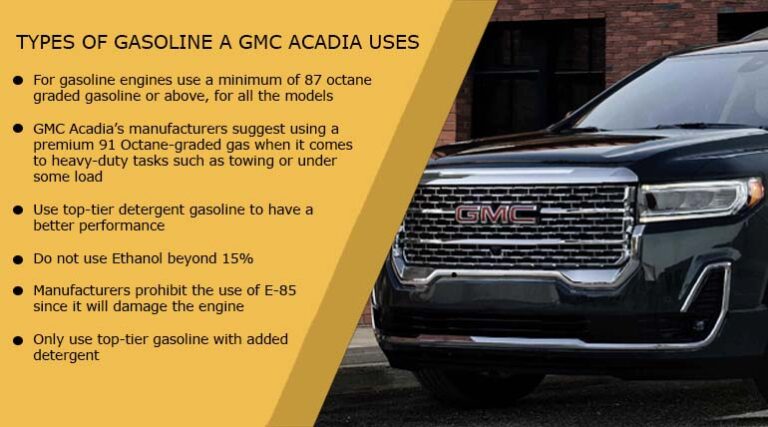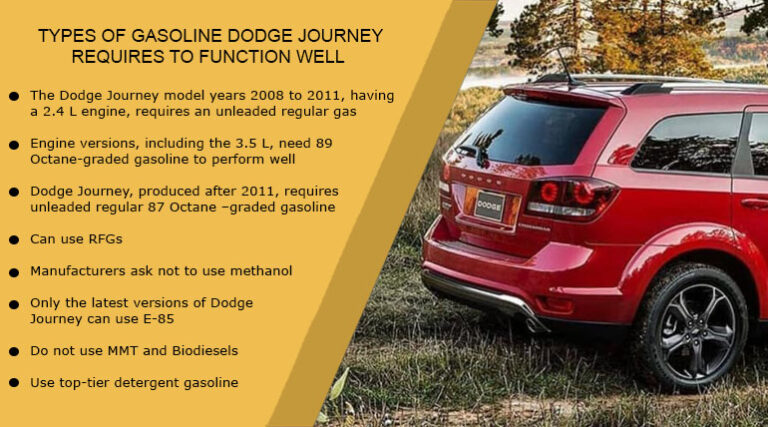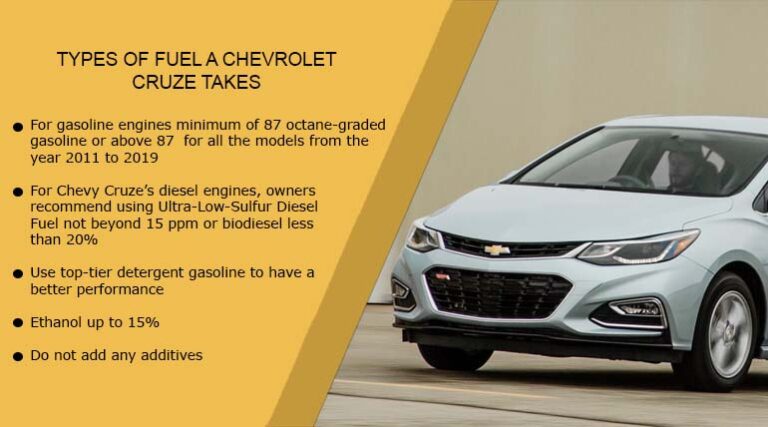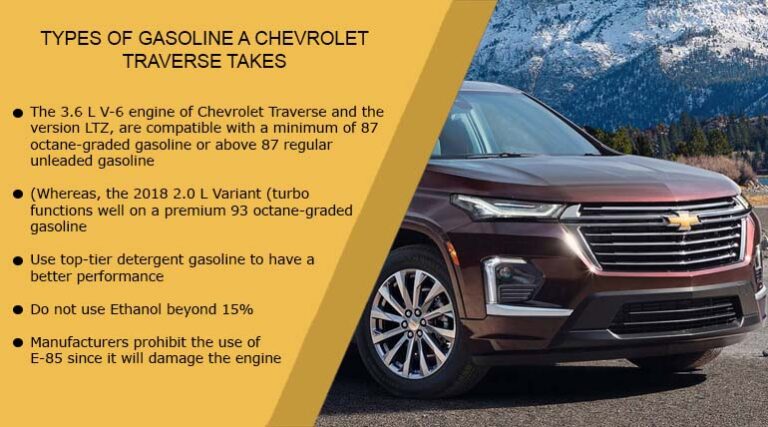Which Types of Gas Cadillac SRX Takes? Regular or Premium?
Fans of automobiles all around the globe have fallen in love with the Cadillac SRX, a high-end crossover SUV. The Cadillac SRX provides a fantastic driving experience because to its sleek façade, prevailing engine, and leading-edge technology. The vehicle’s fuel compatibility is important since it affects both its efficiency and how much fun it is to drive. The types of gas Cadillac SRX takes and their effects on performance and the environment will be explored in depth throughout this article.
An Overview
To recap, the 2004 to 2009 vehicles had two engine options: a 3.6 L V-6 that required unleaded gas with an Octane-level of 87, and a 4.6 L V-8 that required unleaded gasoline with an octane grade of 91. From 2010 to 2016, buyers may choose between three different V-6 engine sizes: 2.8 liters (recommended for premium gas of 93 octane), 3.0 liters, and 3.6 liters (recommended for ordinary unleaded 87 octane).
Types of Gas Cadillac SRX Takes for All Generations
Following are the types of gas Cadillac SRX takes for optimal performance. Let’s explore together, shall we?
Cadillac SRX – 1st Generation (2004 to 2009)
The original SRX was produced between 2004 and 2009, and it came with a choice of a 3.6 L V-6 and 4.6 L V-8 engines. The 3.6 L V-6 engine requires normal gasoline with no lead of at least 87 octane grade for optimal performance. Since greater power was needed by the bigger 4.6 L engine (AWD), therefore, 91 octane fuel was suggested. Cadillac Escalade has similar gasoline type.
| Engine (2004 to 2009) | Compatible Fuel |
| 3.6 L V-6 4.6 L V-8 | Minimum 87, preferable 89 or 91 Octane-graded gasoline |
Cadillac SRX – 2nd Generation (2010 to 2016)
The 1st generation 4.6 L was phased out in favor of the 2.8 L V-6 and 3.0 L V-6 options. For both the 3.0 and 3.6-liter engines, Cadillac recommends using ordinary 87-octane, unleaded gasoline; the 3.6-liter engine also accepts the cleaner-burning E85 mix. The 2.8-liter turbocharged engine only worked with 93-octane premium fuel.
| Engine (2010 to 2016) | Compatible Fuel |
| 2.8 L V-6 (turbo-charge) 3.0 L V-6 3.6 L | 93 Octane-graded Gasoline Minimum 87, preferable 89 or 91 Octane-graded gasoline |
Non-Conventional Fuel Options for Cadillac SRX
Using a variety of different fuels in your Cadillac SRX may improve its efficiency. In this part, you will learn about several other alternative fuels that may be utilized to improve your vehicle’s engine performance;
Reformulated Gasoline Fuel (RFG)
Reformulated Gasoline Fuel (RFG) is the most incredible alternative for those who want to reduce their impact on the environment. Therefore, RFGs would replace regular gasoline in all Cadillac SRX engines.
Oxygenated Blends of Gasoline
The E-30 and E-50 are incompatible with all Cadillac SRX. It will only function with gasoline that has 10% ethanol. The legal limit for ethanol content is 10%. Ethanol-85 is used only for flex-fuel vehicles.
Gasoline with Additives
The Cadillac SRX has strict requirements for fuel. High-end, premium detergent gas is your only option, given that the single legal component is analogous to a cleaning solution. Conscripted are the proscribed additives;
· Solvents
· Methanol
· Any metal-based ones
· Kerosene
· Additives based on metals
· Manganese-based combinations
· Lead-based fuels
Methylcyclopentadienyl Manganese Tricarbonyl (MMT) Based Gasoline
Cadillac claims that the Cadillac SRX gas should be MMT (Methylcyclopentadienyl Manganese Tricarbonyl) free for the reason that doing so might seriously damage the car’s ability to prevent pollution.
Related Article: 14 Frequent Problems of Cadillac SRX
The Leaded Fuel (Gasoline)
If you own an Cadillac SRX, you should avoid using leaded fuel. Using leaded gasoline may damage your car’s 3-way catalytic converters and cause problems with the vehicle’s emission control system.
Biodiesel
All Cadillac SRX models can only operate on standard unleaded gasoline, not the more expensive biodiesel blends. The Cadillac SRX is not designed to run on biodiesels or any other diesel-based fuel, according to the company. Read more about the differences between diesel and gasoline-based engines.
Important Things to Know!
Below section is based on additional information regarding the gasoline types of Cadillac SRX. This will answer all of your further confusions, if any.

Credits @ iihs.org
Unleaded Regular Gasoline
Regular unleaded gasoline, often with an octane value of 87, is the Cadillac SRX’s main and most regularly utilized fuel. Almost all gas stations have this gasoline type, so drivers can easily refill their cars whenever they need to. Unleaded regular gasoline strikes a nice mix between efficiency and cost. It supplies the SRX’s engine with the juice it needs to perform well while keeping fuel expenses in check.
Premium Unleaded Gasoline
The Cadillac SRX can run on regular unleaded petrol or premium unleaded gas with a higher-octane rating (91 or 93) for more power and a smoother ride. Luxury automobiles often have high-compression engines, and these engines benefit greatly from the slower burn rate that premium gasoline provides.
Premium gasoline has the ability to enhance acceleration, operation, and fuel economy. Using premium gasoline in an engine that doesn’t need it may not improve performance, so it’s important to check your owner’s handbook to see whether your SRX model needs or just recommends it.
Flex-Fuel Capabilities
Cadillac’s SRX is available with flex-fuel capability in some areas. These automobiles are optimized to operate on E85, an amalgam of 85% gasoline and 15% ethanol. Ethanol is produced from renewable resources like maize or sugarcane and may help cut down on harmful emissions. To decrease their influence on the atmosphere, eco-conscious motorists may choose ethanol blends like E85, which contains up to 85% ethanol.
Flex-fuel cars may run on either gasoline or ethanol without requiring any adjustments to the vehicle’s settings. However, E85’s decreased energy’s content equated to gasoline leads to inferior fuel economy. Drivers may need to refuel more often while utilizing E85, which might mitigate the fuel efficiency gains.
Considerations and Recommendations
Several aspects should be taken into account while choosing on the best gasoline for your Cadillac SRX. To start, look in the owner’s handbook or call the dealership to find out what kind of gas is preeminent for your car. Using the gasoline, the manufacturer suggests will usually result in the best performance, durability, and efficiency.
Consider your financial constraints and how often you drive. Regular unleaded fuel should be OK if you use your SRX for everyday commute and city driving. However, if you’re looking for a more exciting driving experience and don’t mind spending a little extra on premium gasoline, it might be well worth it.
Potential Repercussions of Inappropriate Fuel Consumption
If you put the improper fuel in your Cadillac SRX, it might damage the engine, reduce gas mileage, and decrease performance. If you use petrol with a lower octane rating than recommended, you risk damaging the engine via knocking or pinging.
Use of higher-than-recommended octane petrol may boost performance and fuel economy, but this cannot be guaranteed. High-octane petrol may not be noticeably more beneficial in a regular engine since it is designed for high-performance engines with high compression ratios.
If you want your Cadillac SRX to continue operating smoothly and effectively, you need to use gasoline that meets the manufacturer’s specifications for both kind and octane rating.
Conclusion
In conclusion, the Cadillac SRX is an outstanding luxury crossover SUV that meets the needs of a wide range of customers. It’s important for owners to know what fuels are compatible with their vehicles. The Cadillac SRX continues to amaze with its adaptability and ability to provide a refined driving experience regardless of whether the driver chooses the ease of conventional unleaded petrol, the improved performance of premium fuel or the eco-friendliness of flex-fuel alternatives.






